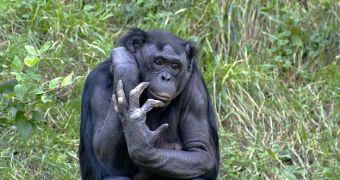In a new scientific investigation, researchers demonstrated that one of our closest primate relatives, the bonobo, oftentimes prefers to share its food with other members of the species, rather than eat alone. This type of behavior is very interesting to scientists, as not many animals engage in it. Of course, many creatures hunt together, but when it's dinner time they eat their share of the catch alone. Experts say that it could be very interesting to learn where this type of behavior originates in bonobos, and also to discover what it's evolutionary roots are, the BBC News reports.
In a set of experiments, researchers deprived a bonobo of its food for a short period of time, so as to make it hungry. Then they set up three adjacent rooms in a straight line. The one in the middle contained some food, one was empty, and the other one had another bonobo inside. The hungry primate was released into the room containing the food, and it had two options – either dine alone, or solve a simple puzzle to open the door to the other primate. In most cases, the animals preferred to eat in the company of others, rather than eat their spoils on their own.
“"We found that the test subjects preferred to voluntarily open the recipient's door to allow them to share the highly desirable food that they could have easily eaten alone,” says Dr Brian Hare, who is a scientist at the Duke University. He conducted the study together with colleague Suzy Kwetuenda, who is based at the Lola y Bonobo center for orphaned primates. The Institution is located in the Democratic Republic of the Congo, and is often used for research into the behavior of these animals. Details of the new investigation appear in the latest issue of the respected scientific journal Current Biology.
The experts say that the next step in their investigation will be to determine precisely why bonobos tend to share their food. They are very curious as to the origins of this behavior, and want to learn whether the primates do it out of a purely-altruistic impulse, or if they are driven by more selfish reasons. It could be that they share food in the hope that, at one point in the future, the bonobo with which they shared might return the favor. These studies could also shed more light on the origin of the same behavior in humans, which tend to share things (including food) since our species first appeared.

 14 DAY TRIAL //
14 DAY TRIAL //